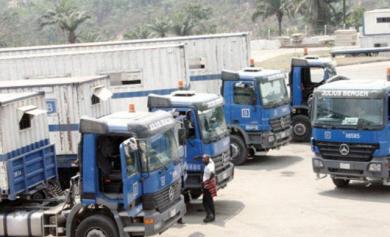
The need for good employee relationship cannot be overemphasized as it encourages productions. However construction company workers in Abuja are subjected to the most deplorable working condition, UCHE UDUMA in this report writes
?
A glance at the overcrowded truck filled with people would make you think the Abuja Municipal Area Council is at it again – sending beggars off the street to a secluded home. However, a close look at the moving truck brought a bunch of tired looking workers into view.
As the moving truck came to a halt, some of the passengers who were holding on to their working tools – as prized possession – hurriedly began to jump down from the vehicle.
As the last passenger for Life Camp junction got off the truck, the other passengers who were comfortably seated on the floor of the truck and a few others leaning against the metal wall of the truck and firmly holding on to the metal frame for support, signaled to the driver to move on .The engine of the truck immediately hummed back to life with a jerk and gradually eased away till it was no longer in view.
Those were construction company workers going home after a hard day’s job.
Abuja being a developing city, obviously offers vast opportunities to the teeming construction companies spread across the town, as the need to build more houses, construct roads and hospital etc has never been more as intensified as it is now. The influx of people into the Federal Capital City has also enabled many construction companies to create a niche for them in the thriving construction business in Abuja.
Obviously it has been a good business for the owners of these companies who have been closing deals worth billions of naira and smiling home with the euphoria of the huge sums of money stashed in their accounts.
Naturally, it is expected that the largess enjoyed by the owners of these construction companies rubs off on the workers; however the story is different as workers are subjected to the most despicable working conditions. Most of the workers are employed on contract basis, not as full staff of the company, thus the company is not liable for their death or any mishap that may happen to them in the line of their duty.
It is a well known fact that construction work is a high risk job that exposes workers to several hazards; however it is painful to discover that most of these are casual workers who do not have insurance cover.
A further twist in the working condition of these construction workers is the jalopy trucks that are used to transport them workers to and fro their places of work – sometimes without seats and roofless, leaving the workers to stand like prisoners at the mercy of harsh weather conditions such as rain and sun.
It is worthy of note that the government had earlier stopped the use of such vehicles to transport workers however, some construction companies are beginning to renege on the instruction.
Some of the construction workers bared their feelings to LEADERSHIP.
Paul Uchebo, a construction worker with Julius Berger said, “They still use the trucks to carry us; it not that we like it but we don’t have option. We are exposed to sun and rain in the open trucks, you know we are in the rainy season; sometimes the rain will meet us in trucks too. These white people don’t value us at all; they value their equipment more than us. If you lose their equipment, no matter how small it is, they won’t mind if you losing your life to find it”.
Another source at Julius Berger added that, “apart from the truck issue, we still have other problems; my salary is N30, 000 and 5,000 is deducted from the salary for tax. We don’t know whether the money is given to government or not, meanwhile are laborers supposed to be paying tax? Is it not business men and company owners that are supposed to be paying tax? Again they collect rent for the accommodation they give us, is that the way it is supposed to be? Again we pay for pension but we don’t know whether it will be given to us.”
A source who works with Dantata and Sawoe lamented; “We are not happy with the working condition here, this is my eleventh year here, and we are paid hourly multiplied by the number of days we work in a month. We do not work Saturdays and Sundays so it leaves us with 24 days. Our wages differ according to the levels. The lowest cadre earns N400 per day, while I am paid N120 per hour so if you calculate it you will know how much we are earning.
“There are still many issues that need to be addressed apart from the truck. Nobody is even talking about minimum wage, are we not part of Nigeria; do we not go to the same market? Yet they don’t want to implement the minimum wage for us”.
Also, LEADERSHIP gathered that although some workers are full staff with employment letters, they are redundant or stood off. Some are told to stay at home without working and are paid pittance at the end of the month, while others are stood off and not given anything at all.
A worker with Lubel Nigerian Limited who was seen getting off a truck with others workers, told LEADERSHIP that he knows nothing about insurance is according to him. “I’m not sure if they have insurance in our company, I want them to move us around in good buses”.
All efforts to speak with the Danata and saowe managers proved abortive as the security operatives said they were not around.

